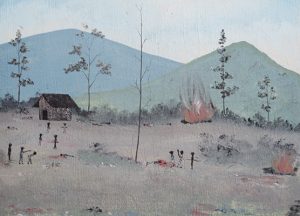Seeds of Truth: A Tale of Two Mountains (Part 1)

We arrived in Guatemala City late Saturday night. Inside the hostel there was a bare wall where a lonely 14 inch TV aired the McGregor / Mayweather fight. What a spectacle. I knew before attending this exchange that there are events the whole world watches, but sometimes you truly need to experience it to understand. The other thing that struck me was the number of McDonald’s signs I saw, along with a number of other popular fast food chains. Is there anywhere that hasn’t been touched by the long arm of consumerism? The following day as the sun rose we would leave the city and enter the beautiful landscapes that characterize Guatemala. But there is a lot of pain beneath these peaks.
The community we were travelling to is called Rabinal. It lies in the heart of Guatemala. To access it we drove through the mountains. It was one of the most beautiful drives I’ve ever experienced. The landscape changed as we pressed on and the signs of poverty were apparent as we passed through the communities. But the most striking thing for me happened just outside a village. As our van climbed the mountain we reached a corner where a family had parked their truck and could be seen tossing garbage off the side of the cliff. Surrounding their vehicle was a large pile of even more trash that had clearly been deposited by other people with the same idea. Later I would learn that the smoke clouds I witnessed on the journey were the product of people burning their garbage. This was tough for me to see, but the heaviest experience was yet to come.
Upon arrival in Rabinal we went to the cemetery to visit monuments that pay respect to the more than 5000 people who were massacred there as part of the genocide that took place in Guatemala in the 1980s. As I listened to our guide and read the names, I found myself staring at the mountains and asking them “If you could speak what would you say?” A feeling of vulnerability came over me that I found frightening. I reflected on how easy it can be for powerful people to prey upon the weak, and I was overcome with a deep sadness that still lingers now as I sit in a school called “Nueva Esperanza” (A New Hope) that was founded as a means for these communities to heal. The contrast to my most recent experience speaking with mountains is extreme.
A month ago I had the fortune to ride aboard the Polar Prince as a part of Canada’s C3 Expedition. The leg I participated in left from my family’s hometown of Iqaluit and traveled all the way to the top of Baffin Island. Beneath the arctic peaks one has the impression of eternal silence. You are alone with that which existed before you, that which will continue to exist after you are gone, and that which allows you to live. There’s a physiological response when they’re observed, similar to the feeling of being threatened. The sense of vulnerability that accompanies it is humbling. Life doesn’t appear to matter as much when you confront the universe as a mere atom. You feel disconnected from the world and its problems. Reality snapped back when we took a hike along a shore that likely hadn’t been walked in more than a decade. A few dozen meters from the shore, still along the path of the tide, we found a piece of plastic about the size of a pop can. This was a more tangible experience for those of us on board who weren’t scientists. A portion of the work the scientists on the ship were doing was collecting samples of the water to measure the amount of micro plastics present.
These moments made it clear to me that we never left nature. Cities are nothing more than changes in the landscape. The phrase ‘out in nature’ only perpetuates the idea that our bubble is disconnected from the rest of the planet, and I believe that it should be removed from popular discourse. Everything is connected, and the connections are being made faster and faster every day. When I try to imagine what has created this excessive waste and death that we see across the planet I see them as the products of consumerism and colonization, which are themselves consequences of greed.
The Seeds of Truth Exchange and the C3 Expedition have deepened my understanding of what is happening in our world, and are strengthening my resolve to work towards establishing a healthy global community. I look forward to processing the tales of these two mountains. The contrasts are sharp, and the comparisons are deeply insightful. As our world changes, the lessons they have to teach us will become more pertinent for us to learn. I am grateful to be a part of both these amazing journeys and to have the opportunity to connect with the land and the communities. They both have much to say to those who will listen. For my part, I will take what I’ve learned and turn that knowledge into wisdom that I can pass on to my friends, family and community. I look forward to sharing the rest of this experience with you all.
Joshua Stribbell was born and raised in Keswick, Ontario. His family is from Iqaluit, Nunavut. He is a Youth Worker for Inuit in Toronto. (Read his full bio)




